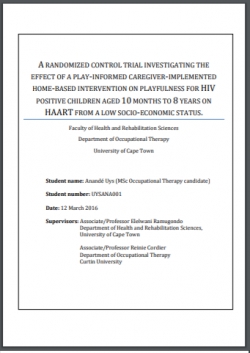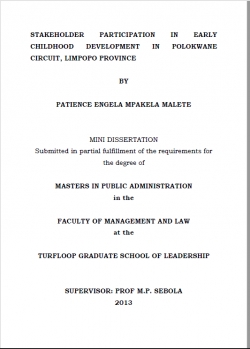The influence of socio-economic conditions on the motor development of Grade 1- learners in the North West Province of South Africa

Type
Thesis
Authors
Category
ECCE, Foundation
[ Browse Items ]
Publication Year
2013
Publisher
North West University, Potchefstroom, South Africa
URL
[ private ]
Pages
126 p.
Subject
Early childhood development, Motor development, Socio-economic conditions, Object control, Physical development, Primary education, Children, South Africa
Tags
Abstract
It appears from the literature that the mastery of motor skills is essential for the optimal development of young school beginners' cognitive, perceptual, sport-specific and emotional skills. Researchers agree that the optimal development and mastering of motor skills occurs during specific sensitive periods in each child's life, and this is why it is important that children are provided with appropriate opportunities to develop these skills. The conditions in which a child grows up appear to be a significant factor influencing motor development during childhood. Environmental factors such as socio-economic conditions seem to play a role in the development of young children's motor skills . Literature suggests that poor motor development generally occurs among children with insufficient areas for playing, and results from low socio-economic conditions in which the parents have a low income and limited resources. A large percentage of South African children are exposed to low socio-economic conditions that may consequently affect their development. The objectives of this study therefore were to determine the effect of socio-economic conditions on the motor- and object-control skills of Grade 1-learners. Eight hundred and sixteen (N=816) (+0.39 sd) Grade 1-learners with an average age of 6.8 years from 20 different schools in the North West Province, representing five different school types (quintile 1 (low) to quintile 5 (high), participated in the study. The short form (SF) of the "Bruininks-Oseretsky Test of Motor Proficiency" 2nd edition (BOT-2) (Bruininks & Bruininks, 2005), as well as several subscales (strength and agility and balance) of the longer form (LF) were used to evaluate gross and fine motor development and divide learners into various categories of mastering. The “Test of Gross Motor Development” 2nd edition (TGMD-2), was used to evaluate object control skills and divide subjects into various mastered categories. The data was analyzed by means of analysis of variance correlation coefficients using the "Statistica for Windows" (Statsoft, 2012) program. The results were adjusted for height and age. Two-way frequency tables and cross-tabulations were also used to analyze the data. With regards to objective 1 , the resluts showed that learners from quintile 4 and 5 schools, representing schools from higher socio-economic conditions, scored significantly better than quintile 1 to 3 schools in six sub-items (fine motor precision, fine motor integration, manual dexterity, bilateral coordination, strength and upper limb coordination) of the BOT-2 (SF) (p<0.05) while no differences were found in the LF subscales. Quintile 4 and 5 schools also received significantly better (p<0.05) scores in the SF standard score and percentiles of the BOT-2. The results indicate d> that the motor proficiency of learners from higher socio-economic conditions were better than those of learners from lower socio-economic conditions. With regards to the second objective of the study, the analysis of the results indicated that quintile 5 schools performed significantly better (p<0.05) in throwing, hitting, dribbling, and catching than quintile 1 to 3 schools, while quintile 1 and 3 schools performed significantly better (p≤0.05) in the kicking skill. Quintile 4 and 5 schools also fared significantly better (p<0.05) in the object control standard score than quintile 1 to 3 schools. The group's age equivalent, according to the TGMD-2, was 5.5 years, and ranged from 5.1 years to 5.9 years, indicating a mean age difference of 1.3 years compared with the chronological age of the group.
Number of Copies
1
| Library | Accession No | Call No | Copy No | Edition | Location | Availability |
|---|---|---|---|---|---|---|
| 1 | Potchefstroom, North West Province, South Africa | Yes |


